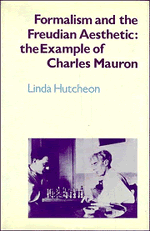Book contents
- Frontmatter
- Contents
- Preface
- Acknowledgments
- Introduction
- Part I The critical formation: science, formalism, and aesthetic contemplation
- 1 Early roots: science, Bloomsbury, and Roger Fry
- 2 The attraction of formalism
- 3 Art and science
- 4 Toward psychocritique: from “spiritual” to “psychological”
- Part II Psychoanalysis and literary criticism
- Conclusion
- Appendices
- Notes
- Index
4 - Toward psychocritique: from “spiritual” to “psychological”
Published online by Cambridge University Press: 12 January 2010
- Frontmatter
- Contents
- Preface
- Acknowledgments
- Introduction
- Part I The critical formation: science, formalism, and aesthetic contemplation
- 1 Early roots: science, Bloomsbury, and Roger Fry
- 2 The attraction of formalism
- 3 Art and science
- 4 Toward psychocritique: from “spiritual” to “psychological”
- Part II Psychoanalysis and literary criticism
- Conclusion
- Appendices
- Notes
- Index
Summary
A literary judgment, though based on the closest scientific assessment of the objective facts, is not genuine unless coloured by the subjective intention of the originator. A view, not merely of literature, but of life is involved; not merely the science of writing, but also the philosophy of being.
herbert readMANY YEARS AGO NOW, Edmund Wilson convinced us that the French symbolists greatly influenced the entire generation we have been considering here. Axel's Castle outlined the literary debt that Yeats, Joyce, and others owed to those hermetic poets and their theories of verse. In criticism too, the symbolists could not be ignored. Benedetto Croce attacked their idea of purity in art as a false one, mistrusting their valuing of suggestiveness. T. S. Eliot, on the other hand, saw them as prime examples of aesthetic classicism, with their “excellence of form, their perfection of phrasing,” and their transmutation of ideas into sensations. Roger Fry's attraction to Mallarmé, in particular, was one of his first points of artistic contact with Mauron. Fry had begun translating Mallarmé early, attracted by his “sincerity” and purity as a poet. The valise carrying his translations was stolen at the Gare St. Lazare in 1920, but Fry, undaunted, began reworking, reconstructing the English version, this time with Mauron's help. In 1930, Fry asked his friend to write accompanying commentaries for the poems. Mauron worked on these on his own, though he admitted that the two men freely compared “impressions” (1938a [1936]: 4).
- Type
- Chapter
- Information
- Formalism and the Freudian AestheticThe Example of Charles Mauron, pp. 62 - 94Publisher: Cambridge University PressPrint publication year: 1984



